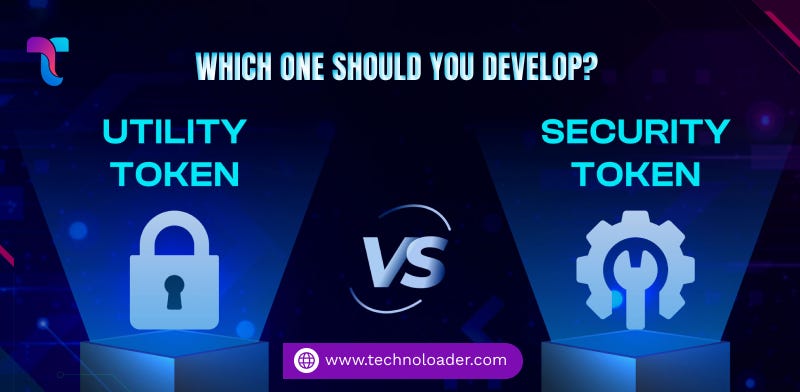So, you’re thinking about developing a token but can’t decide between utility tokens and security tokens? You’re not alone. This is a common dilemma in the crypto world. While both types of tokens have their use cases, the right choice depends on your project goals, legal considerations, and business model.
In this blog, we’ll break down the differences, benefits, and challenges of utility and security tokens, helping you decide which one suits your needs. Let’s dive in.
Understanding Utility Tokens
Utility tokens give users access to a product, service, or platform. They function like a digital coupon or a membership card rather than an investment. These tokens are widely used in decentralized applications (dApps) and blockchain-based ecosystems.
Examples of Utility Tokens
- Ethereum (ETH) — Used for transactions and smart contract execution.
- Binance Coin (BNB) — Initially a discount token for trading fees on Binance, now used for multiple purposes.
- Filecoin (FIL) — Used to pay for decentralized storage services.
Pros of Utility Tokens
- No strict regulations — Since they aren’t considered financial securities, compliance is easier.
- Faster fundraising — Many startups launch utility tokens through ICOs (Initial Coin Offerings).
- High adoption potential — They encourage user engagement and loyalty.
Challenges of Utility Tokens
- Market volatility — Their value depends on platform adoption and demand.
- No investment guarantee — Since they aren’t tied to profits, investors may hesitate.
- Regulatory uncertainty — Some governments may classify them as securities if misused.
Understanding Security Tokens
Security tokens represent an investment in an asset, company, or project. They are subject to financial regulations and provide token holders with rights such as profit-sharing, voting, or dividends. Think of them as a digital version of traditional stocks or bonds.
Examples of Security Tokens
- tZERO (TZROP) — Represents equity ownership in tZERO.
- SpiceVC — A security token offering (STO) for venture capital investment.
- Securitize — A platform issuing security tokens backed by real assets.
Pros of Security Tokens
- Legal protection — Since they follow regulatory frameworks, they offer investor security.
- Trust and transparency — Investors feel safer knowing the project follows financial laws.
- Potential for passive income — Investors may receive dividends, profit shares, or voting rights.
Challenges of Security Tokens
- Strict regulations — Security tokens must comply with legal frameworks, making issuance complex.
- Limited market accessibility — Unlike utility tokens, security tokens are restricted to accredited investors in many countries.
- Expensive compliance — Projects may face higher costs for audits, legal fees, and regulatory approvals.
Utility vs Security Tokens: Key Differences
1. Purpose
Utility Tokens: These tokens provide access to a service, product, or platform. They function like a membership pass or in-app currency.
Security Tokens: These represent a financial investment in a company, project, or asset. They work similarly to stocks or bonds.
2. Regulation
Utility Tokens: Lightly regulated since they are not considered financial securities. However, misuse can lead to legal scrutiny.
Security Tokens: Strictly regulated under financial laws, requiring compliance with securities regulations in different countries.
3. Investor Rights
Utility Tokens: Holders do not get ownership rights, dividends, or voting power. Their value depends on demand and platform adoption.
Security Tokens: Holders may receive dividends, profit shares, and voting rights, just like traditional stockholders.
4. Market Accessibility
Utility Tokens: Available to anyone; no restrictions on who can buy or trade them.
Security Tokens: Often restricted to accredited investors due to legal and regulatory requirements.
5. Fundraising Methods
Utility Tokens: Typically launched through Initial Coin Offerings (ICOs) or direct token sales.
Security Tokens: Issued through Security Token Offerings (STOs) and other regulated investment models.
Which One Should You Develop?
Now comes the big question — which token is right for your project? Let’s break it down:
Choose Utility Tokens If:
- You are building a blockchain-based platform or dApp.
- Your token will be used for transactions, rewards, or services.
- You want to launch quickly without dealing with strict regulations.
- You are targeting a broad audience, including retail users.
Example: If you’re creating a decentralized streaming platform where users pay for content with tokens, a utility token makes sense.
Choose Security Tokens If:
- You need to raise funds through legally compliant investment models.
- Your token will be tied to real assets like real estate, company shares, or bonds.
- You want to attract institutional investors who seek long-term value.
- You are prepared to comply with financial regulations.
Example: If you’re launching a blockchain-based real estate investment fund, a security token would be ideal.
Final Thoughts
Choosing between a utility token and a security token isn’t just about preference — it’s about aligning your token with your project’s goals, legal considerations, and target market. While utility tokens offer flexibility and faster adoption, security tokens provide stability and investor trust.
Still unsure which token to develop? Technoloader can help. As a leading token development company, Technoloader specializes in custom token development, security audits, and regulatory compliance to ensure your token launch is smooth and successful.
Get in touch with Technoloader today and take your blockchain project to the next level.
Call/Whatsapp: +91 7014607737 | Email: info@technoloader.com



